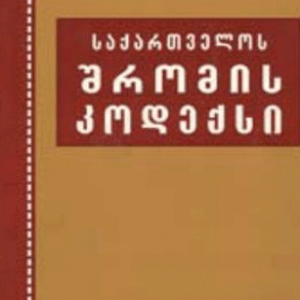Gela Mtivlishvili
 Lack of Labor Contract in Georgian media is still problem. According to lawyers, this mechanism guarantees editorial freedom in media. According to them, labor agreement is a guarantee to avoid interference in the media activities. Media sources did not sign labor contracts with journalists even when the employer was obliged to sign labor contract under Labor Code. The situation became more complicated after amendments were introduced to the Labor Code and the obligation of signing agreement was cancelled.
Lack of Labor Contract in Georgian media is still problem. According to lawyers, this mechanism guarantees editorial freedom in media. According to them, labor agreement is a guarantee to avoid interference in the media activities. Media sources did not sign labor contracts with journalists even when the employer was obliged to sign labor contract under Labor Code. The situation became more complicated after amendments were introduced to the Labor Code and the obligation of signing agreement was cancelled.
Journalists working without labor contracts say the employer did not offer them to sign any agreements when started working. We inquired why they did not request the agreement and they answered they might have remained without job. It turned out that journalists which working for the projects funded international organizations also do not hold labor contracts. According to some correspondents, they get salaries in cash without signing any financial document. Journalists do not use privileges envisaged by the Labor Code because they do not have contracts. They cannot take a holiday for 24 working days and are not compensated in case of resignation.
Because of lack of contracts, journalists are especially unprotected in the media sources which are under governmental control. We were informed about several facts when journalists were dismissed without explanations because officials did not like the critical articles written by the journalists.
Several cases of breached rights of Journalists are mentioned in the Public Defender’s reports to the parliament. According to the ombudsman’s office, there is no regulation which will prevent the media owner to interfere in editorial activities.
“Institute of editorial freedom is acknowledged based on principle in the Law on Freedom of Expression. However, besides that, there is no separate legal definition of this concept, current legislation does not envisage real mechanisms for the realization of editorial freedom,” it is written in the report of the Public Defender.
After new Labor Code was enacted, labor contract as a guarantee to protect editorial freedom faced a new challenge. Until May 25, 2006 written form of labor contract was considered imperatively under article 19 of the Labor Code. However media sources illegally avoided to sign contracts with journalists.
Case of journalist Rusudan Nikuradze for Moscow office of TV-company “Rustavi 2” is an obvious example of this. In addition to that, petitions of Tamar Okruashvili, Saba Tsitsakishvili and others against the founder of the regional TV and radio company “Trialeti” Badri Nanetashvili which were discussed by Public Defender; rights and responsibilities of journalists were not clarified because of lack of labor contracts. As a result, journalists had to clean the territory around TV-radio-company.
Lawyer Lia Khuroshvili said after amendments were introduced to the Labor Code article 6 made the work of the media owner easier, because according to the first part of the article 6, Labor Contract is made in written or verbal form for definite, indefinite or employment term.
“In such cases the journalist is responsible to claim requirements of the verbal contract, though the main problem is not to prove the fact, but what conditions are considered in the verbal contract to protect employee from employer’s willful activities,” states lawyer.
According to the Public Defender’s office, this problem was raised in the case of Tsaulina Malazonia. She was journalist for independent newspaper “South Gate” in Akhaltsikhe district from September 1 to December 31, 2006. During this period written labor contract was signed with her, which clarified rights and responsibilities of the parties including salary of 300 GEL. From January 1 to April 2007 the salary of journalists were considerably reduced, that’s why she left job. The employee had made only verbal agreement about new amount of salaries.
“Salary as a compensation for permanent and repeated work shall not be regulated by verbal agreement. Written labor contract is necessary in case of long-term labor relations, rights and responsibilities of parties shall be clearly clarified in it. If we look through the debates related with the current law, it will be clear that initiators of the draft-law had similar goals, though the final version could not determine the cases when verbal agreement is acceptable. Written contract is especially important for the journalists working for concrete media organizations,” stated representatives of the Public Defender’s Office.



